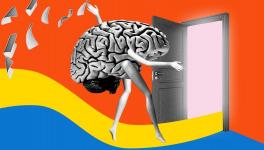Do Dreams Represent Mental Well-being?

Do dreams say anything about one’s mental status? A cognitive neuroscience study recently published in the Nature journal has shown that dreams are representatives of the mental status of a person. People with more peace of mind in the waking state are more likely to have dreams with a positive effect, whereas those who experienced anxiety in the waking state are subjected to nightmares.
It has been well-recognized that mental well-being is reflected in sleep patterns, but how dreams are affected by one’s mental state still remains a subject that is ripe for deeper scientific investigations. So far, researchers have focussed mainly on the dreams of people with various psychological disorders. Interpretations made in this direction have revealed many aspects of mental ill-being and its interference with dreams. Even in clinical practices, dreams have long been considered as markers of mental health. But how mental well-being affects dreams is an area where there still haven’t been enough findings. A study done by Pilleriin Sikka and his team has come up with empirical findings that show how dreams can get affected by positive mental states.
Dreams are subjective experiences that occur during sleep. This makes them very difficult to be accessed directly, even by brain mapping technologies. Therefore, the only way to study them is by the subject recalling them while awake. A person can say what he dreamt of and whether it was pleasant or unpleasant only when he recalls it while he is awake. To access the impact of mental peace or anxiety on dreams is difficult. First of all, the researcher has to assign factors that may represent mental peace. Then, the representative factors of mental peace have to be cautiously found, and the characteristics of dreams have to be related to them.
Sikka and his team developed a questionnaire to judge the mental status of the participants that took part in their study. In the questionnaire, they tried to find out mental attributes like life satisfaction, job satisfaction, satisfaction with their friends, anxiety, depression, etc., that can represent the mental status of the participants. Then, in the following three weeks, the participants were asked to maintain a daily dream diary. In their dream diaries, they had to report on their dreams and their ratings of the emotions they experienced in their dreams. An analysis of the results shows that the individuals with a higher level of mental peace had more positive dreams and those with anxiety and depression had more negative dreams. Positive and negative dreams were categorized by the emotions that the dreams represented and the ratings of the emotions as done by the participants.
The researchers proposed that the mental state of people can affect the way they regulate their emotions. Individuals with a higher level of peace of mind may be better in regulating their emotions, both in waking and dreaming state; while the case might be opposite for those with greater anxiety and depression.
Get the latest reports & analysis with people's perspective on Protests, movements & deep analytical videos, discussions of the current affairs in your Telegram app. Subscribe to NewsClick's Telegram channel & get Real-Time updates on stories, as they get published on our website.

















